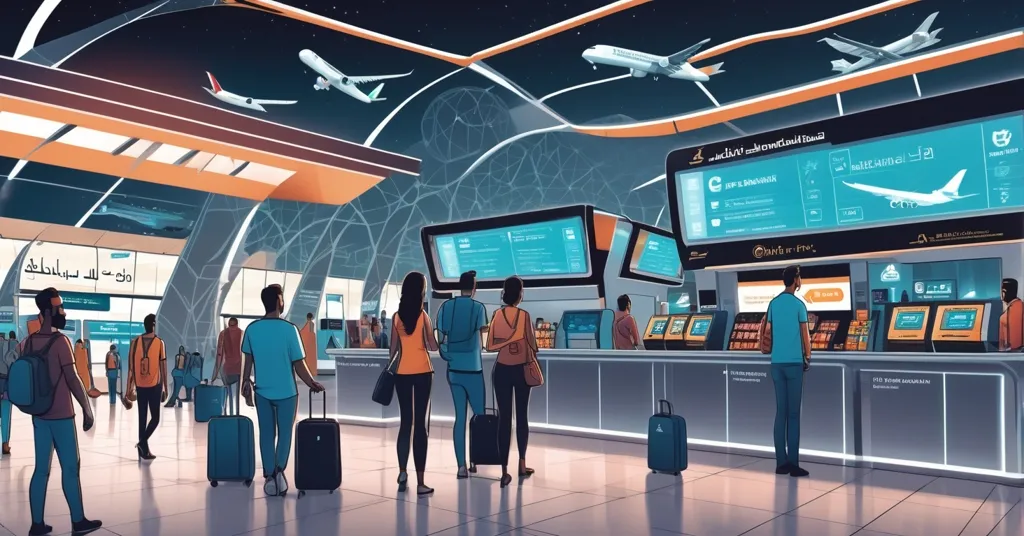Emirates and Dubai Duty Free Partner with Crypto.com for Crypto Payments by 2025

Emirates and Dubai Duty Free Join Forces with Crypto.com for Bitcoin and Crypto Payments by 2025
Dubai is making a loud statement in the world of digital finance: Emirates, together with Dubai Duty Free, has signed a Memorandum of Understanding (MoU) with Crypto.com to integrate cryptocurrency payments into their retail and travel commerce operations, targeting a rollout in 2025. This partnership, announced straight from the heart of innovation in the UAE, signals a seismic shift toward mainstreaming crypto in one of the globe’s busiest travel hubs.
- Major Partnership: Emirates and Dubai Duty Free signed an MoU with Crypto.com on July 8, 2024, to bring crypto payments to retail by 2025.
- Dubai’s Digital Drive: This aligns with the UAE’s aggressive push to lead in blockchain and digital asset adoption across multiple sectors.
- Regulatory Tightrope: While innovation thrives, regulatory hurdles loom, as seen with the UAE’s smackdown of The Open Network (TON)’s golden visa scam.
What the Emirates and Dubai Duty Free Partnership Means for Travelers
Announced by Sheikh Ahmed bin Saeed Al Maktoum, President of the Dubai Civil Aviation Authority and Chairman of Dubai Duty Free, on X around July 9, 2024, this deal was finalized at Emirates Group Headquarters in Dubai. It’s not a small experiment—the MoU covers joint marketing efforts, customer engagement programs, and a sharp focus on enhancing user experience. For the millions passing through Dubai International Airport (DXB), one of the world’s busiest with over 86 million passengers annually, this could mean paying for duty-free luxury goods, flight upgrades, or even onboard purchases with Bitcoin, Ethereum, or other digital currencies supported by Crypto.com’s platform. For those new to the space, Crypto.com is a heavyweight cryptocurrency exchange and payment processor, offering trading, digital wallets, and seamless integration tools for businesses looking to bridge traditional commerce with decentralized finance.
Dubai Duty Free, a titan in airport retail with a staggering AED 4.118 billion turnover in the first half of 2024 (a 5.34% jump year-over-year), sees this as more than a tech stunt. Their Managing Director, Ramesh Cidambi, laid it out plainly:
“This MoU underscores our commitment to innovation and to providing greater convenience and choice for our customers. Dubai Duty Free wants to enhance the retail experience. Embracing digital currency payments is a forward-looking step that will add significant value for our diverse customer base and support our vision for sustained growth.”
In simpler terms, they’re betting that crypto will turn shopping at DXB into a futuristic flex for their global clientele. With a customer base as diverse as their product lineup, adding crypto payments—both in-store and online—could attract tech-savvy travelers already dabbling in digital wallets or curious enough to jump in. The impact of this partnership on travel retail could be significant if executed well.
Crypto.com’s top brass are equally pumped. Eric Anziani, President and COO, sees this as a turning point for everyday crypto use:
“Integration with exceptional partners such as Dubai Duty Free brings real momentum to the digital asset industry. It enables both companies to offer innovative finance solutions and supports Dubai’s broader vision for digital leadership.”
Alain Yacine, President of Crypto.com Middle East, doubled down, emphasizing that this MoU is a platform to build comprehensive digital finance products with a premier regional partner. But let’s not kid ourselves—Crypto.com isn’t just a shiny tech savior. They’ve had their share of bumps, like a 2021 hack that reportedly cost users millions, though they’ve since beefed up security. Their track record with payment integrations globally, including branded Visa cards, shows they’ve got the chops, but partnering with giants like Emirates, as detailed in this recent MoU announcement, comes with sky-high expectations.
Will Crypto Payments Work in a High-Flying Retail World?
Let’s get real: paying for a bottle of Chanel or an extra legroom seat with Bitcoin sounds cool, but it’s not without turbulence. Volatility is the ugly gremlin here. Imagine shelling out 0.01 BTC for a $500 duty-free haul, only to see Bitcoin tank 5% overnight—Emirates nets $475 worth. Who eats that loss? Then there’s the user experience hurdle. Not every traveler knows how to navigate a crypto wallet, and even fewer want to fumble with QR codes while rushing to a gate. Transaction fees, potential delays for blockchain confirmations, and refund policies in a volatile market are all question marks. Will Emirates prioritize stablecoins like USDT to dodge wild swings, or lean on Bitcoin for its security and brand power? As Bitcoin maximalists, we’d argue BTC should take center stage for its unmatched network strength, but Ethereum’s smart contracts or stablecoins could fill practical niches. For insights into how crypto payments might work at Dubai Duty Free, the challenges are evident.
Education and slick design will be make-or-break. Dubai Duty Free’s scale and innovation history give them a shot at pulling this off by 2025, but expecting a seamless utopia on day one is naive. If they nail the user interface and pair it with incentives—think bonus miles for crypto payments—they might just convert skeptics into believers.
Dubai’s Bigger Blockchain Play: Real Estate and Finance
This partnership is just one cog in Dubai’s massive blockchain machine. The emirate is hell-bent on leading the digital revolution across industries. On July 6, 2024, just days before the Emirates deal, the Dubai Land Department signed an MoU with Crypto.com to explore tokenized real estate under the Real Estate Strategy 2033, aiming for a jaw-dropping Dh1 trillion in transactions. For the uninitiated, tokenization turns physical assets like property into digital tokens on a blockchain—a tamper-proof ledger that records every transaction. Think of it as buying shares in a company, but for a Dubai penthouse. You could own a fraction of prime real estate with a few clicks, no multimillion-dollar buy-in required. Projects like PRYPCO Mint, backed by frameworks from the Virtual Assets Regulatory Authority (VARA), the Central Bank of UAE, and the Dubai Future Foundation, have already rolled out two tokenized property listings, as explored in this tokenized real estate partnership.
Financial innovation is also heating up. The Dubai Financial Services Authority (DFSA) recently approved the QCD Money Market Fund, the first tokenized fund in the Dubai International Financial Centre (DIFC), alongside Qatar National Bank (QNB) and DMZ Finance. These moves scream ambition, positioning Dubai as a sandbox for decentralized tech while trying to keep the chaos in check with regulatory guardrails. The broader context of Dubai’s blockchain initiatives shows how deep this commitment runs.
The Dark Side: Scams and Regulatory Roadblocks
Before we get too dazzled, let’s talk about the potholes. Dubai’s crypto journey isn’t all glitz—there’s plenty of grit. Take the fiasco with The Open Network (TON), a blockchain tied to Telegram’s early vision. TON hyped a deal where staking $100,000 in Toncoin (basically locking up crypto to earn rewards, like a high-risk savings account) plus a $35,000 fee could snag a UAE golden visa with a 3-4% yield in under seven weeks. Sounds like a golden ticket, right? More like fool’s gold. UAE authorities, including the Federal Authority for Identity, Citizenship, Customs and Port Security, and VARA, slammed the brakes, stating flat-out that digital assets don’t qualify for golden visa eligibility. For clarity, the golden visa, launched in 2019, offers 5-10 year residency to investors or skilled folks through legit channels like AED 2 million in real estate—not crypto gambles. The regulatory stance on TON’s golden visa claims was a sharp reality check.
The fallout was textbook crypto chaos. Toncoin spiked 10% to $3.03 on the hype, then cratered 6% to $2.84 once reality hit. It’s the crypto equivalent of selling beachfront property in the desert—a stark reminder that not every shiny promise holds up. This clash highlights Dubai’s tightrope walk: fostering innovation while stomping out snake oil. Compared to Singapore’s iron-fisted licensing or the EU’s sprawling MiCA regulations, Dubai’s VARA framework feels more inviting yet still ruthless enough to crush nonsense. But every misstep like TON’s risks spooking legit investors or slowing the adoption train. Even for the Emirates rollout, VARA’s oversight will likely shape how crypto payments unfold—expect strict KYC checks or limits on supported coins to keep scams at bay.
Is This a Solution Looking for a Problem?
Playing devil’s advocate, let’s ask the hard question: do travelers really need crypto payments, or is this a flashy PR stunt? Most folks at DXB are happy with cards or cash—why complicate things with a volatile, niche option? The average tourist isn’t clamoring to pay for overpriced airport coffee with Bitcoin, and businesses might balk at the accounting headaches of crypto’s wild swings. This could be Dubai flexing its “futuristic” brand more than solving a real pain point. On the flip side, for the crypto crowd and high-net-worth jet-setters, it’s a signal of legitimacy, a chance to spend digital wealth without cashing out. Plus, it fits Dubai’s obsession with being first—whether it’s the tallest building or the boldest blockchain bet. Community reactions to this Crypto.com partnership reflect a mix of excitement and skepticism.
Could This Spark a Global Ripple?
Looking ahead, the Emirates and Dubai Duty Free partnership could be a blueprint for others. If it works, expect competitors like Qatar Airways or global retailers to take notice. Imagine Bitcoin ATMs dotting DXB by 2026, or crypto payments becoming standard at major airports from Singapore to New York. Dubai’s high-traffic hub—86 million passengers yearly—makes it a perfect testing ground. Success here could prove crypto’s viability in retail at scale, pushing adoption beyond niche online exchanges. Failure, though, might reinforce skeptics’ view that decentralized tech isn’t ready for prime time. Either way, Dubai isn’t playing small, and that audacity alone is worth watching. For more on the specifics of this collaboration, check out the full details of the MoU.
Key Takeaways and Burning Questions on Dubai’s Crypto Frontier
- What’s the big deal with Emirates and Crypto.com teaming up?
This partnership paves the way for crypto payments in travel retail by 2025, potentially normalizing Bitcoin and other digital currencies in high-traffic hubs like Dubai International Airport. - How is Dubai pushing blockchain beyond airport shopping?
Through tokenized real estate with the Dubai Land Department, targeting Dh1 trillion in transactions by 2033, and tokenized financial funds in DIFC, Dubai is redefining investment and commerce. - What are the risks of this crypto rush?
Scams like TON’s debunked golden visa scheme and regulatory pushback show hype can outrun reality, threatening trust and stability in the market. - Can crypto payments go mainstream in travel by 2025?
It’s doable but tricky—volatility, user education, and transaction hiccups are hurdles; Dubai Duty Free’s scale and innovation streak give it a shot. - How does volatility impact crypto at checkout?
Price swings could mean businesses or customers lose value post-transaction, a real pain point unless stablecoins or instant conversions are prioritized. - What can other nations learn from Dubai’s playbook?
Balancing bold innovation with firm regulation, as seen with VARA’s Bacon oversight, offers a model—though missteps like TON’s fiasco show the need for relentless vigilance.
Dubai’s crypto waltz is a daring dance between groundbreaking innovation and the raw edge of risk—one misstep could throw off the rhythm. The Emirates and Dubai Duty Free collaboration with Crypto.com stands as a flagship effort, potentially reshaping how we think about money in transit. Meanwhile, the UAE’s broader strides—tokenized assets, financial experiments, and a no-nonsense stance on fraud—paint a complex portrait of a nation hungry to lead the decentralized charge. Whether this cements Dubai as the blockchain capital or exposes the limits of hype, one thing is undeniable: they’re swinging for the fences, and in a space often mired in empty promises, that gutsy spirit is a damn refreshing sight.



